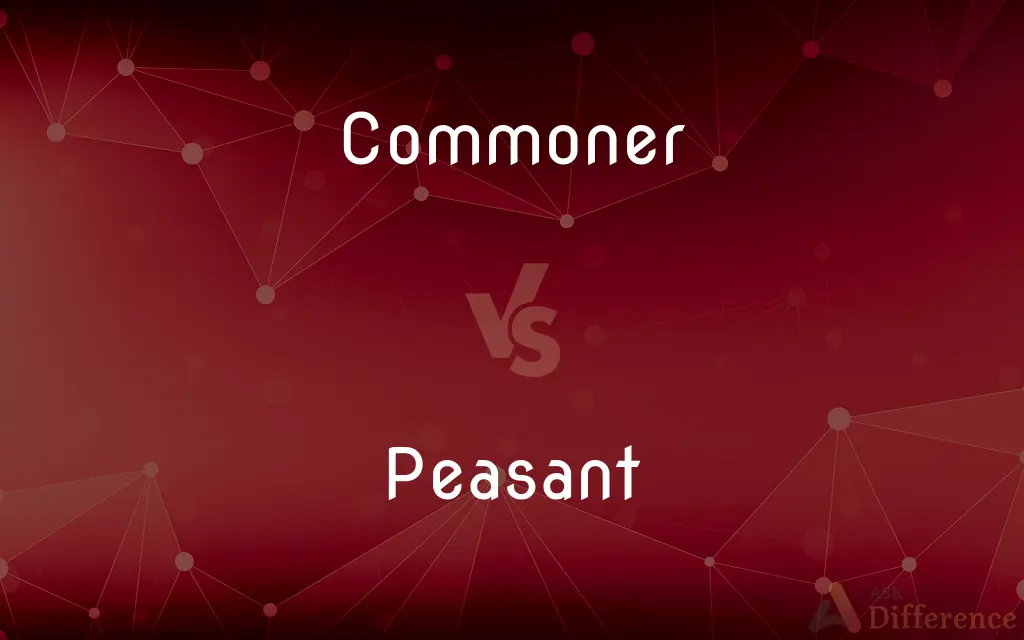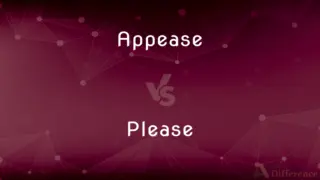Commoner vs. Peasant — What's the Difference?
By Tayyaba Rehman & Maham Liaqat — Updated on May 8, 2024
Commoners are broadly non-noble people in society, often with diverse economic statuses, while peasants specifically refer to agricultural laborers under feudal systems.

Difference Between Commoner and Peasant
Table of Contents
ADVERTISEMENT
Key Differences
Commoners encompass all individuals in a society who are not part of the aristocracy or nobility, including a wide range of social and economic statuses. Whereas peasants are specifically those who work on the land, typically within a feudal or similar agricultural system.
Commoners can be involved in various professions and may possess varying degrees of wealth and educational backgrounds. On the other hand, peasants are primarily involved in farming, often under conditions of servitude or low economic status.
In historical contexts, commoners could rise in social and economic standing through trade, education, or other means, while peasants were generally bound to the land and their status was more fixed.
Social mobility for commoners varies significantly from one region to another, depending on societal structures and historical periods. Conversely, peasants usually had limited opportunities to improve their status due to the restrictive nature of feudal systems.
Politically, commoners have had varying degrees of power and influence, ranging from significant roles in mercantile cities to passive roles in strict hierarchies. In contrast, peasants typically had little political power and were often subject to the will of landowning nobility.
ADVERTISEMENT
Comparison Chart
Definition
A non-noble person in society
An agricultural worker in a feudal system
Economic Status
Can range from poor to wealthy
Generally poor and land-bound
Professional Variety
Diverse, from trades to professions
Primarily agricultural labor
Social Mobility
Variable, can be significant
Generally limited
Political Power
Varies, sometimes significant
Typically minimal or none
Compare with Definitions
Commoner
Any individual outside the aristocracy.
As a commoner, she was not allowed into the royal enclosure.
Peasant
A rural agricultural laborer under feudalism.
The peasant tilled the fields from dawn till dusk.
Commoner
A term used historically to describe non-nobles.
The commoners were granted voting rights much later than the nobles.
Peasant
A term sometimes used pejoratively for rural poor.
He dismissively called them peasants because of their village origins.
Commoner
A member of society who does not hold a noble title.
John is a commoner who runs a successful business in the city.
Peasant
Often used to describe a lower economic and social class in agrarian societies.
The peasants were the backbone of the medieval economy.
Commoner
A general term for the populace.
The festival was a gathering place for commoners from all around.
Peasant
Historically, tied to the land and the lord's estate.
The peasants were required to give a portion of their harvest to the lord.
Commoner
A commoner, also known as the common man, commoners, the common people or the masses, was in earlier use an ordinary person in a community or nation who did not have any significant social status, especially one who was a member of neither royalty, nobility, nor any part of the aristocracy. Depending on culture and period, other elevated persons (such members of clergy) may have had higher social status in their own right, or were regarded as commoners if lacking an aristocratic background.
Peasant
A person with a small plot of land in historical contexts.
The peasant's family lived off what they could grow themselves.
Commoner
One of the common people.
Peasant
A peasant is a pre-industrial agricultural laborer or a farmer with limited land-ownership, especially one living in the Middle Ages under feudalism and paying rent, tax, fees, or services to a landlord. In Europe, three classes of peasants existed: slave, serf, and free tenant.
Commoner
A person without noble rank or title.
Peasant
A poor smallholder or agricultural labourer of low social status (chiefly in historical use or with reference to subsistence farming in poorer countries)
Peasant farmers
Commoner
A member of the common people who holds no title or rank.
Peasant
A member of a class of small farmers and farm laborers, especially in a preindustrial or underdeveloped society.
Commoner
(British) Someone who is not of noble rank.
Peasant
A person who lives in a rural area; a rustic.
Commoner
A student who is not dependent on any foundation for support, but pays all university charges; at Cambridge called a pensioner.
Peasant
A person who is considered crude or uncouth; a boor.
Commoner
Someone who has a right over another's land. They hold common rights because of residence or land ownership in a particular manor, especially rights on common land. eg: centuries-old grazing rights
Peasant
A member of the lowly social class that toils on the land, constituted by small farmers and tenants, sharecroppers, farmhands and other laborers on the land where they form the main labor force in agriculture and horticulture.
Commoner
(obsolete) One sharing with another in anything.
Peasant
A country person.
Commoner
(obsolete) A prostitute.
Peasant
(pejorative) An uncouth, crude or ill-bred person.
Commoner
One of the common people; one having no rank of nobility.
All below them [the peers] even their children, were commoners, and in the eye of the law equal to each other.
Peasant
(strategy games) A worker unit.
Commoner
A member of the House of Commons.
Peasant
(attributive) Characteristic of or relating to a peasant or peasants; unsophisticated.
Peasant class
Commoner
One who has a joint right in common ground.
Much good land might be gained from forests . . . and from other commonable places, so as always there be a due care taken that the poor commoners have no injury.
Peasant
Lowly, vulgar; reprehensible; dishonest.
Commoner
One sharing with another in anything.
Peasant
A countryman; a rustic; especially, one of the lowest class of tillers of the soil in European countries.
Commoner
A student in the university of Oxford, Eng., who is not dependent on any foundation for support, but pays all university charges; - - at Cambridge called a pensioner.
Peasant
Rustic, rural.
Commoner
A prostitute.
Peasant
A country person
Commoner
A person who holds no title
Peasant
One of a (chiefly European) class of agricultural laborers
Peasant
A crude uncouth ill-bred person lacking culture or refinement
Common Curiosities
Who are considered peasants?
Peasants are agricultural workers, particularly in feudal systems, with limited rights and freedoms.
Can a commoner become wealthy?
Yes, commoners can achieve various levels of wealth and influence, unlike peasants who are typically more economically restricted.
Were peasants free to leave their land?
In many feudal societies, peasants were not free to leave the land they worked on without permission.
What rights did commoners have historically?
Rights of commoners varied widely, but they generally had more legal rights and opportunities for mobility than peasants.
What defines a commoner?
A commoner is defined as any individual in a society who is not part of the nobility or royalty.
How did one become a peasant?
Peasants were typically born into their role, with families working the same land across generations.
Are all peasants poor?
Historically, most peasants were poor, but their economic status could vary slightly based on land fertility and ownership.
What type of work did commoners do?
Commoners engaged in a wide range of occupations, from artisans and merchants to professionals and laborers.
How were peasants treated by the law?
Peasants generally had fewer legal protections and were often subject to harsh treatment under feudal law.
Can commoners hold political power?
Yes, commoners have held political power, especially in societies with democratic or mercantile systems.
Do the terms "commoner" and "peasant" have the same meaning?
No, while both are non-noble, "commoner" is a broader term, and "peasant" specifically refers to agrarian laborers under feudalism.
Did peasants own the land they worked on?
It was rare for peasants to own the land; most often, they worked land owned by nobles.
Were there commoners in all historical societies?
The concept of commoners is applicable in societies with distinct class systems, especially where an aristocracy exists.
How is a commoner different from a civilian?
"Commoner" specifically refers to non-nobility, whereas "civilian" refers to non-military persons.
What was the typical lifestyle of a peasant?
Peasants typically led hard lives focused on agricultural labor with little time or resources for other activities.
Share Your Discovery

Previous Comparison
Uninhibited vs. Disinhibited
Next Comparison
Appease vs. PleaseAuthor Spotlight
Written by
Tayyaba RehmanTayyaba Rehman is a distinguished writer, currently serving as a primary contributor to askdifference.com. As a researcher in semantics and etymology, Tayyaba's passion for the complexity of languages and their distinctions has found a perfect home on the platform. Tayyaba delves into the intricacies of language, distinguishing between commonly confused words and phrases, thereby providing clarity for readers worldwide.
Co-written by
Maham Liaqat












































